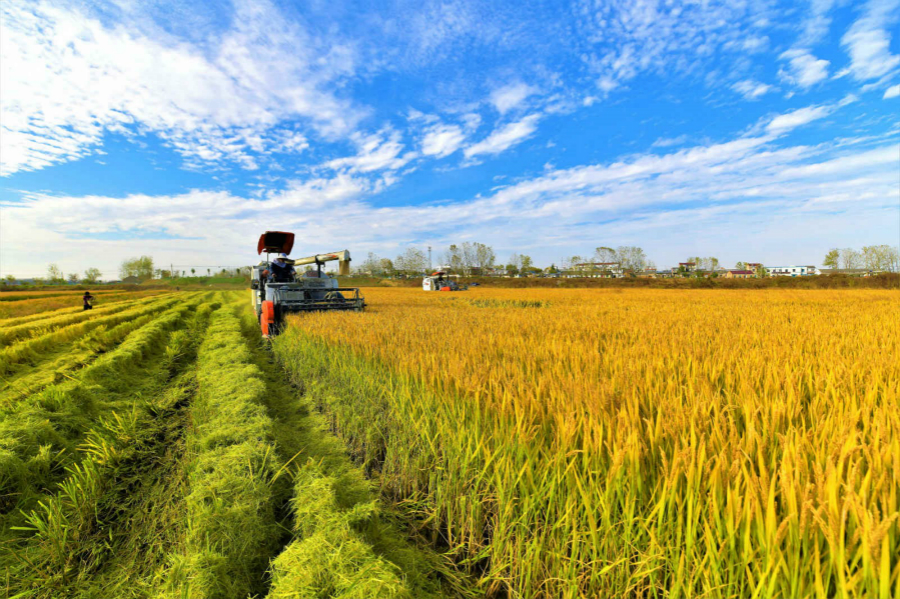China to advance work related to agriculture, rural areas, farmers with concrete efforts

A vast paddy field covering over 1,000 mu (66.7 hectare) of a cooperative in Wangcheng community, Badou township, Feidong county, Hefei, east China's Anhui province is being reaped, Nov. 4, 2020. [People's Daily Online/Gao Desheng]
The central rural work conference of China was held on Dec. 28 and 29, 2020. The conference, convened at such a historical juncture when China is about to enter its 14th Five-Year Plan period (2021-2025) and embark on a new journey of building a socialist modern country in an all-round way, carried great significance.
The conference released a clear signal from the Communist Party of China (CPC) to the society that solving issues related to agriculture, rural areas and farmers is the top priority for the CPC.
Rural work is the most arduous task and the most extensive and deepest foundation for building a socialist modern country in an all-round way and achieving national rejuvenation of China.
Since the 18th National Congress of the CPC in 2012, the CPC Central Committee with Comrade Xi Jinping at its core has made poverty alleviation a benchmark of its efforts to build a moderately prosperous society in all respects, launched a poverty alleviation campaign at unprecedented levels in terms of the scale, intensity, and impact, and initiated the rural revitalization strategy. All these efforts have led to historic achievements and changes in China's rural areas and agriculture.
China's grain output has exceeded 650 billion kilograms for six consecutive years, and farmers’ income has doubled from that a decade ago. Rural livelihood is significantly improved, and the rural areas have taken on a completely new look. Earth-shaking changes have taken place in poverty-stricken areas, and historic achievements have been made in tackling absolute poverty, an issue that had bothered the Chinese nation for thousands of years. All this has made huge contributions to building a moderately prosperous society in all respects and laid a solid foundation for China to embark on a new journey of building a socialist modern country in an all-round way.
China is about to enter a new development phase as it kicks off the 14th Five-Year Plan, when the domestic and external environments are about to embrace profound and complicated changes.
To consolidate and extend the achievements of poverty alleviation, comprehensively push forward rural revitalization and accelerate the modernization of agriculture and rural areas is a major issue that concerns the overall situation and deserves high attention from the CPC, especially when China is marching toward its second centenary goal and has completed its poverty alleviation mission, and when the COVID-19 pandemic is accelerating the profound changes of the world.
Despite the notable achievements made in the work related to agriculture, rural areas and farmers, China still sees an unstable agricultural foundation, and the development gap between urban and rural areas and insufficient rural development remain the major social contradictions.
As the external environment becomes more unstable and uncertain, to stabilize the overall performance of agriculture, and consolidate the work related to agriculture, rural areas and farmers is a ballast stone for China to respond to changes and open up new prospects.
China has reached its poverty eradication goals as scheduled, thanks to its decades of efforts, especially those made in the recent eight years. This is a major victory that astonishes the world.
Now, the country's mission is to comprehensively advance rural revitalization, which is a historic transition of the focus of its work related to agriculture, rural areas and farmers. To do a good job in the rural work, it is necessary to consolidate and extend the achievements of poverty alleviation, align the achievements of poverty alleviation with rural revitalization, improve the monitoring and assistance mechanism to prevent people from falling back into poverty, ensure smooth transition of policies, and revitalize the rural areas that have bid farewell to poverty.
Efforts should be made to ensure food security and strengthen food production year by year, and the country must retain a "red line" of 1.8 billion mu (120 million hectares) of arable land.
The country should build high-standard farmland, strive to be self-reliant in agricultural technologies, accelerate to tackle core technologies related to agriculture, encourage farmers to grow more grains, and stabilize and increase subsidies for farmers.
It is also necessary to comprehensively promote the implementation of rural revitalization policies, accelerate the development of rural industries, foster stronger observance of socialist cultural and ethical standards, enhance the construction of rural ecological civilization, deepen rural reform, implement rural construction, promote urban-rural integration, and strengthen and improve rural governance.
























